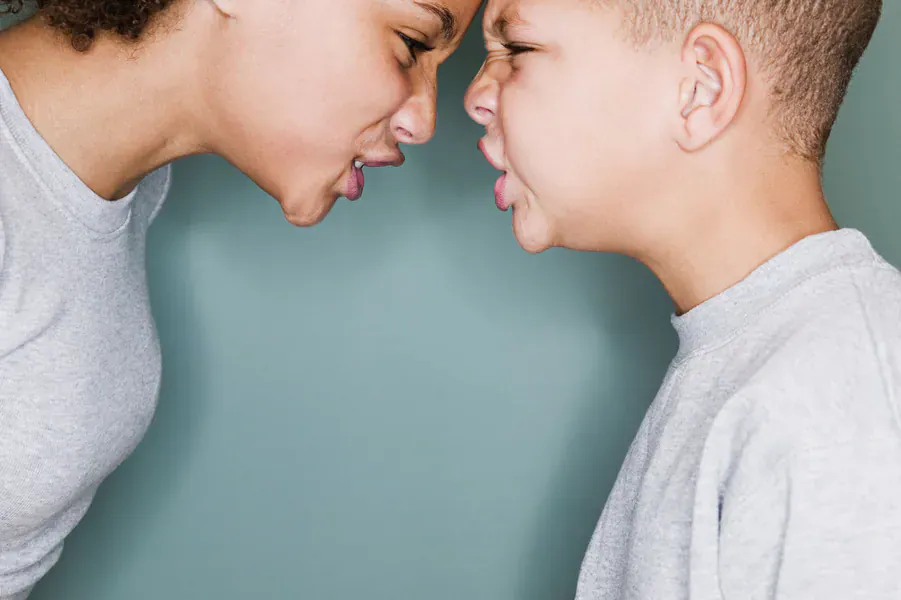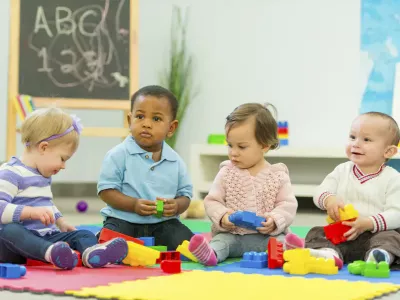How to take the fight out of aggressive child behaviour

When a gorgeous little baby suddenly turns into a toddler or little one who bites, hits, or is otherwise aggressive, it can be confusing, confronting, embarrassing and even a little frightening.
As well as worrying about your child’s behaviour, or even being hit or kicked yourself, you may have other adult reactions to deal with, such as:
- Friction between parents about how to deal with the behaviour
- Official notes home from kindergarten or school
- Confrontations with other parents if their child has been hurt by yours.
You may even think you can’t manage your child’s behaviour, or that you don’t know anyone else who seems to be having this problem. You may wonder if things will get worse as they get older.
But actually a very large number of toddlers do push, hit, or act aggressively, and this may even be a behaviour pattern with a biological or evolutionary basis. Sometimes these particular child behaviours occur more when children are young, and experimenting with different ways of interacting with others.
Depending on what kind of response they get – the toy they wanted from another child, a reaction from an adult, the other person backing down – they may, in effect, be learning that physical aggression is a way of controlling other people. If, by behaving aggressively, they get what they want, then in the child’s eyes, it is seen as effective. They’re being accidently rewarded for upping the ante.
ANGER IS OKAY, AGGRESSION IS NOT
Anger is a normal emotion and everyone feels angry from time to time. What kids need to have explained to them is that it’s okay to be angry but it’s not okay to bite your mother on the leg when you’re in the shopping centre.
FAMILY DYNAMICS – SOMETIMES COMPLEX, SOMETIMES NOT
It may be tempting to think that until a child is able to speak clearly themselves, they aren’t capable of noticing what’s going on around them, but this isn’t the case. Right from babyhood, they will observe their social world, including what they see on television. They’ll watch how older siblings deal with friction, look at what goes on in the playground or the park, and silently observe how parents handle times where they want something or are annoyed. If they see a world of violence and aggression, lashing out, hitting, kicking, pushing, then these are the behaviours younger children will be more likely to try.
Aggressive behaviours can arise if there’s jealousy in the family, for example, where a parent is giving too much attention to a younger sibling or a new partner. There may be other underlying family problems. But sometimes kids continue to be aggressive purely because they crave attention. Living in a family means being part of team; some children take longer than others to understand they’re not the centre of the universe.
Whatever the reason – biology, experimenting, mimicking what they’ve seen, or feeling frustrated because they don’t have the necessary language or problem-solving skills – effective parenting doesn’t mean waving a wand to revamp a child’s personality. What we want to do is steer a child’s behaviour in the right direction and teach them better ways of doing things.
So that means, for example, turning aggressive behaviour into more assertive behaviour that doesn’t involve hurting others. Kids are inevitably going to encounter situations they find frustrating: for example, they want to play with a certain toy, or on the playground swings, or on the computer, but it’s someone else’s turn.
Learning to manage child behaviour is really about helping children learn social skills and self-regulation. So in this context, that would mean as parents we want to teach them that instead of either quietly giving up, or saying “it’s my turn” and then pushing or hitting, they can make requests of others in an assertive but not aggressive way.
START EARLY IF YOU CAN
- Have a few, simple, basic family rules, such as keep your hands and feet to yourself. Children should grow up knowing that hitting is just simply not acceptable: you might be upset, you might be annoyed, but it is not okay to lash out and hurt.
- When you’re teaching kids these new skills and behaviours, pay attention. If an older brother or sister provokes a younger one, show them that rather than lashing out and attacking the older sibling, they can do something else – for example, ask the older one to stop teasing, or go somewhere else to play. Reward your child with praise if they try one of these new ways of dealing with conflict.
EARLIER IS IDEAL, BUT EVEN OLDER KIDS CAN LEARN
Ideally, parents are supported to develop skills and strategies to effectively manage aggressive child behaviour when it first occurs.
Children who are older, who have had years of learning to be aggressive, can be more difficult to turn around. However, it’s important to note that older children are quite capable of learning new social skills such as how to be assertive rather than aggressive.

